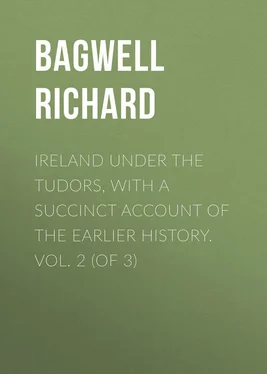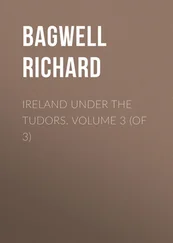Richard Bagwell - Ireland under the Tudors, with a Succinct Account of the Earlier History. Vol. 2 (of 3)
Здесь есть возможность читать онлайн «Richard Bagwell - Ireland under the Tudors, with a Succinct Account of the Earlier History. Vol. 2 (of 3)» — ознакомительный отрывок электронной книги совершенно бесплатно, а после прочтения отрывка купить полную версию. В некоторых случаях можно слушать аудио, скачать через торрент в формате fb2 и присутствует краткое содержание. Жанр: foreign_antique, foreign_prose, Историческая проза, на английском языке. Описание произведения, (предисловие) а так же отзывы посетителей доступны на портале библиотеки ЛибКат.
- Название:Ireland under the Tudors, with a Succinct Account of the Earlier History. Vol. 2 (of 3)
- Автор:
- Жанр:
- Год:неизвестен
- ISBN:нет данных
- Рейтинг книги:4 / 5. Голосов: 1
-
Избранное:Добавить в избранное
- Отзывы:
-
Ваша оценка:
- 80
- 1
- 2
- 3
- 4
- 5
Ireland under the Tudors, with a Succinct Account of the Earlier History. Vol. 2 (of 3): краткое содержание, описание и аннотация
Предлагаем к чтению аннотацию, описание, краткое содержание или предисловие (зависит от того, что написал сам автор книги «Ireland under the Tudors, with a Succinct Account of the Earlier History. Vol. 2 (of 3)»). Если вы не нашли необходимую информацию о книге — напишите в комментариях, мы постараемся отыскать её.
Ireland under the Tudors, with a Succinct Account of the Earlier History. Vol. 2 (of 3) — читать онлайн ознакомительный отрывок
Ниже представлен текст книги, разбитый по страницам. Система сохранения места последней прочитанной страницы, позволяет с удобством читать онлайн бесплатно книгу «Ireland under the Tudors, with a Succinct Account of the Earlier History. Vol. 2 (of 3)», без необходимости каждый раз заново искать на чём Вы остановились. Поставьте закладку, и сможете в любой момент перейти на страницу, на которой закончили чтение.
Интервал:
Закладка:
O’Donnell himself was released after a captivity of two years and nine months, partly perhaps because he had been a troublesome prisoner. According to Cusack, or rather to Shane, who was his informant, he had given up Lifford, promised many kine and much plate and jewels, and released his ancient claim to the suzerainty of Innishowen. In the absence of documentary evidence no one is bound to believe this, and in any case, promises extracted by torture could hardly be thought binding. O’Donnell was indeed in no condition to pay such a ransom, for he had lost all control over his country. He had incurred unpopularity by paying a pension to Argyle as the price of his faithless wife. O’Neill had, however, seized Con in revenge for the alleged breach of contract. ‘Con,’ said Sir Thomas Wrothe, ‘is as wise and active an Irishman as any in Ireland:’ he was married to an O’Neill, and there was a suspicion that the lady favoured her father rather than her husband. Cusack advised Arnold to give O’Donnell nothing but fair words, and a letter to Shane bidding him use his prisoner well. On reaching Dublin O’Donnell was accordingly received with outward marks of respect, but Arnold refused to give him any help or to allow him to go to England. He was reminded that his grandfather, who was ‘the honestest O’Donnell that ever was,’ never came to the governor but to ask aid when banished by his son, and that son was in turn banished by his son the present suppliant. Calvagh was told that he came not now for service but for help, for which he would go to the Turk, and that no O’Donnell ever did come for service, nor was able to hurt the Pale, except when allied with O’Neill, Maguire, Magennis, O’Rourke, and O’Reilly. The family quarrels of the O’Donnells could not be denied, but they might at least be matched by those of the O’Neills, and there was something savouring strongly of meanness in the rest of the answer, when we reflect that Calvagh had been in alliance with the English Government at the time of his misfortune. The cause had been determined against him beforehand, but he came before the Lord Justice and Council to hear his statement read, and to add what might be required by word of mouth. ‘Hearing his bill read,’ says Wrothe, ‘he burst out into such a weeping as when he should speak he could not, but was fain by his interpreter to pray license to weep, and so went his way without saying anything. Sure it pitied me to see him, and more because his present help is doubtful, for although it may be said that the wisest to win peace will take war in hand, and that it is likely Shane will not be reformed but by war,’ yet the poverty of Ireland and the occupation of England made war well-nigh impracticable. 84 84 Wrothe to Lord R. Dudley, July 23, 1564; Cusack to same, June 9, and a paper dated June 13, which summarises his case against O’Donnell; Cusack to Cecil, June 9, and to Arnold, June 13. The Four Masters say Con O’Donnell was taken by Shane O’Neill, May 14, but they have not a word of the alleged breach of contract: they are, however, partial to the O’Donnell family.
Arnold seems to have thought himself bound to do in all things exactly the opposite of Sussex, and he accepted Cusack’s rose-coloured view of Shane’s intentions. But Wrothe’s reasoning was more dispassionate. He saw the danger of letting O’Donnell’s country come under the power of O’Neill, who gave good words but went his own way nevertheless. If possible he was to be pacified, but war might prove inevitable, and to be successful it would have to be conducted in a new way. He saw that O’Donnell was determined to go to the Queen with or without license, and if necessary by way of Scotland. The Queen said she would willingly see O’Donnell at Court if it would do him any good, but that the causes between him and Shane would have to be tried in Ireland, and she did not see what he could gain by the journey. She saw Arnold’s bias clearly enough, and said plainly that the Dean and Chapter of Armagh, who had been named, were no fit Commissioners to judge of this matter. Terence Daniel and his colleague had a too natural affection towards O’Neill. As Wrothe had foreseen, O’Donnell, who feared that chains and torture awaited him in Ulster, would not be denied, but took the first opportunity of slipping over to England during Arnold’s temporary absence, and he made his appearance at Court, where he told his griefs to the Queen, and to Leicester, Winchester, and Cecil. Elizabeth evidently felt much for the unfortunate chief, gave him money, and sent him back to Ireland, directing Arnold to make him some allowance until his causes were decided. ‘We are not,’ she said, ‘without compassion for him in this calamity, specially considering his first entry thereto was by taking part against Shane when he made war against our good subjects there.’ No one was ever able to resist Elizabeth when she spoke graciously, but O’Donnell’s experience of Arnold had not been satisfactory, and he thought it prudent to withdraw for a time to the Scottish Court, where he was sure of sympathy from the relations of his foolish and guilty wife, the daily victim of Shane’s brutality. 85 85 Wrothe to Cecil, June 18; the Queen to Lord Justice and Council, July 15 and Dec. 13; Randolph to Cecil, Dec. 24, 1564 (S.P., Scotland).
His hereditary enemies having been reduced to a harmless state, Shane proceeded, with the full approval of the Government, to attack the Scots, who prevented him from doing as he pleased in the North. But Arnold was not so completely blinded by his professions as to make him free of Carrickfergus, which he claimed as of ancient right. Neither was it thought convenient to withdraw Kildare from the defence of the Pale, as Shane urgently desired. Eight or nine hundred Scots, under the command of Sorley Boy, lay near the left bank of the Bann, opposite Coleraine, where Shane had made the old castle tenable. His object being to get complete command of the estuary, he sent over a small party in the country boats or ‘cots,’ which were his only means of transport, and having posted them strongly in the Dominican Friary, withdrew to his main body. The Scots attacked the outpost like madmen, as Dean Danyell expressed it, and lost many men, but succeeded in killing all the defenders except the mounted men, who were seized with a panic and swam their horses over the flooded river. Neither party had much to boast, but Shane could point to the affair as a test of his sincerity. He bragged about what he would do next time, when there might be no flood, and he again suggested that he might be allowed to make Carrickfergus his base until preparations for renewing the war were complete. Arnold yielded so far as to sanction his entry with some of his chief followers. Captain Piers was to show the formidable visitor every civility, but for sparing of the poor town was to keep the multitude of his company as far off as possible. Shane’s views changed, or the policy of Piers was successful in keeping him at arm’s length, but he plundered the town of Carlingford before doing any further service against the Scots, burned the country all about, and ravished the women far and wide, up to the walls of Dundalk. More damage has been done, said Fitzwilliam, ‘than seven years of such profit as is from Shane.’ 86 86 Lord Justice and Council to O’Neill, Aug. 22 and Sept. 14; Terence Danyell to Lord Justice, Aug. 21 and Sept. 10; Shane O’Neill to Lord Justice and Council, Sept. 5 – ‘Non est opus nunc habere me suspectum quantum ad servicium impendendum contra Scotos.’ This did not prevent him from clamouring for aid at the Scotch Court; see Randolph’s letter before cited. Randolph had seen two of Shane’s letters. Lord Justice and Council to Piers, Sept. 17; Fitzwilliam to Cecil, Jan. 17, 1565; and the Declaration of Sussex, Jan. 29.
Интервал:
Закладка:
Похожие книги на «Ireland under the Tudors, with a Succinct Account of the Earlier History. Vol. 2 (of 3)»
Представляем Вашему вниманию похожие книги на «Ireland under the Tudors, with a Succinct Account of the Earlier History. Vol. 2 (of 3)» списком для выбора. Мы отобрали схожую по названию и смыслу литературу в надежде предоставить читателям больше вариантов отыскать новые, интересные, ещё непрочитанные произведения.
Обсуждение, отзывы о книге «Ireland under the Tudors, with a Succinct Account of the Earlier History. Vol. 2 (of 3)» и просто собственные мнения читателей. Оставьте ваши комментарии, напишите, что Вы думаете о произведении, его смысле или главных героях. Укажите что конкретно понравилось, а что нет, и почему Вы так считаете.












